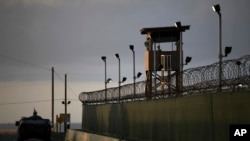The U.S. Senate is considering legislation that could make it even tougher for President Barack Obama to fulfill a central pledge from his 2008 campaign: closing the U.S. detention facility at Guantanamo Bay, Cuba.
The Senate began debate Wednesday on the National Defense Authorization Act, a policy bill that sets forth congressional guidance for all Pentagon spending and operations for 2016.
Championed by John McCain of Arizona, the Republican chairman of the Senate Armed Services Committee, the bill allows for closing Guantanamo – but only if the president submits a plan for doing so that both houses of Congress approve.
The NDAA also erects hurdles for transferring detainees out of the camp.
“President Obama has said from day one of his presidency that he wants to close Guantanamo, but 6½ years into his administration, the president has never provided a plan to do so,” McCain said.
“That plan would have to include a case-by-case determination on the disposition of each detainee at Guantanamo Bay. The plan would also have to address how the Defense Department would ensure the continued detention and intelligence collection from future combatants captured under the laws of war," he added.
Established by the former George W. Bush administration after the attacks of September 11, 2001, the Guantanamo Bay facility once held nearly 800 enemy combatants captured in the war on terrorism. That number has dwindled to 122, and nearly half of those have been approved for transfer to other countries.
Harmful or indispensable?
Obama has long maintained the facility does more harm than good by staining America’s reputation on the world stage and serving as a recruiting tool for terrorist groups.
Republican backers of Guantanamo Bay said it is an indispensable tool for holding and interrogating America’s enemies, and note that some detainees released from the camp have again taken up arms against the United States.
The facility has spawned protracted political battles on Capitol Hill and legal battles that reached the Supreme Court. To this day, it serves as a dividing line on thorny questions surrounding national security, civil liberties, due process of law, the use of torture, and the lengths to which America can or should go to fight terrorism.
The White House has threatened a veto of the NDAA in its current form, objecting to budgetary provisions and other elements.
On Guantanamo, the administration said the bill would set back the effort to close the camp and infringe on executive branch prerogatives in handling individual detainee cases.
Senator Jack Reed of Rhode Island, the top Democrat on the Armed Services Committee, echoed those concerns, saying parts of the bill would “take us backwards.”
“In the 2014 NDAA, the committee granted the secretary of defense more flexibility and streamlined authorities for overseas transfers of detainees,” Reed said. “Unfortunately, the bill before us today would undo that progress and reimpose restrictions.
“These backward-looking restrictions create an unnecessary roadblock for disposing of the 57 detainees currently at Guantanamo who have been approved for overseas transfer, most of whom were approved nearly five years ago," he said.
Carter's views
The man charged with carrying out the president’s policies – and abiding by laws Congress passes on Guantanamo Bay – is Defense Secretary Ash Carter.
At his Senate confirmation hearing this year, Carter acknowledged America’s need to hold terror suspects but did not say whether Guantanamo was best suited to do so.
“If not Gitmo, where are they going to be incarcerated?” Carter asked. “Because what’s plain as day is that they need to be incarcerated in a super-max [maximum security] type place.”
National security analysts say a politically divided Washington further complicates shuttering the camp.
“There is no question that closing Guantanamo before President Obama leaves office will be difficult, but it can still happen,” said Ken Gude at the Center for American Progress, a public policy research group in Washington.
“There is ample time this year, before any new restrictions are passed by Congress, to transfer a large number of detainees out of the prison – large enough so that we are talking about less than 50 that remain in Guantanamo, and once we get down to that size, the answers become much more realistic than when we are talking about more than 100," Gude said.
Location is issue
Gude noted that even if Guantanamo were closed, several dozen detainees deemed most dangerous to America would remain in U.S. custody.
“The choice is never [between] the U.S. getting rid of all detainees and holding no one," he said. "It’s whether or not the remaining detainees are located at Guantanamo or some other location.”
Congress did not act to close Guantanamo during the first two years of the Obama administration, when both houses were controlled by the president’s Democratic Party.
Now that Republicans control both chambers, Gude is especially doubtful that any proposal to close the camp will pass.
He said years of legislative resistance to the idea pointed to a pitfall that existed from the start of the detainee program, which diverged from traditional prisoner-of-war operations.
“The Bush administration removed all those detainees from the area in which they were captured and located them far away in Guantanamo, and created this entirely new construct [for holding prisoners],” Gude said.
“Both the Bush and the Obama administrations have had policies of trying to close Guantanamo now for almost a decade, and we can’t seem to do it.”




